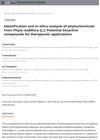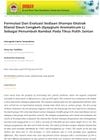Using enzymes to link proteins makes hair repair treatments more effective and long-lasting.
February 2023 in “European biophysics journal” [object Object]  January 2023 in “International Journal of Contemporary Pediatrics”
January 2023 in “International Journal of Contemporary Pediatrics” A rare genetic disease causes rickets and often hair loss in young children, which can improve with specific treatments.
 January 2023 in “Biomaterials Science”
January 2023 in “Biomaterials Science” Certain genes are more active during wound healing in axolotl and Acomys, which could help develop materials that improve human wound healing and regeneration.
 January 2023 in “Indian dermatology online journal”
January 2023 in “Indian dermatology online journal” Skin problems after waxing led to a sarcoidosis diagnosis.
 January 2018 in “Georg Thieme Verlag eBooks”
January 2018 in “Georg Thieme Verlag eBooks” Gender affirmation surgery improves personal appearance and self-esteem.
 December 2024 in “Pharmaceutics”
December 2024 in “Pharmaceutics” Spironolactone nano-formulations show promise for treating skin disorders, but more research is needed for safety and effectiveness.
 December 2024 in “Plant Science Today”
December 2024 in “Plant Science Today” Phyla nodiflora contains compounds that may help treat diabetes, alopecia, cancer, and anti-diuresis.
 December 2024 in “Frontiers in Pediatrics”
December 2024 in “Frontiers in Pediatrics” Baricitinib improved platelet counts and alopecia in a 16-year-old with chronic immune thrombocytopenia.
 December 2024 in “Pharmaceutics”
December 2024 in “Pharmaceutics” Extracellular vesicles show promise for treating psoriasis by reducing inflammation and skin lesions.
October 2024 in “Acta Biomaterialia” Collagen makes skin stiff, and preservation methods greatly increase tissue stiffness.
 September 2024 in “International Journal of Applied Pharmaceutics”
September 2024 in “International Journal of Applied Pharmaceutics” A reliable method was developed to measure Finasteride and Tadalafil in rat blood.
 August 2024 in “Quality in Sport”
August 2024 in “Quality in Sport” Lifestyle changes like diet and exercise are crucial for managing PCOS.

A 15% clove leaf extract shampoo promotes hair growth but is less effective than minoxidil.
 July 2024 in “Current Pharmaceutical Design”
July 2024 in “Current Pharmaceutical Design” Biodegradable polymers help wounds heal faster.
June 2024 in “JURNAL BIOLOGI TROPIS” Moringa oleifera Lamk. shows promise as an effective anti-acne treatment.
[object Object]  June 2024 in “International Journal of Nanomedicine”
June 2024 in “International Journal of Nanomedicine” CRISPR/Cas9 has improved precision and control but still faces clinical challenges.
 May 2024 in “Indian Journal of Dermatology”
May 2024 in “Indian Journal of Dermatology” The woman has a rare skin condition called follicular Dowling-Degos disease, which has limited treatment options.
 March 2024 in “Stem cell research & therapy”
March 2024 in “Stem cell research & therapy” Human dental pulp stem cell-conditioned medium, especially from hypoxic conditions, may help treat chemotherapy-induced hair loss and does not increase cancer risk.
 March 2024 in “Journal of Endocrinological Investigation”
March 2024 in “Journal of Endocrinological Investigation” Finasteride treatment in rats changed the expression of genes related to psychiatric and neurological functions, and these changes persisted after stopping the drug.
 March 2024 in “Middle East Fertility Society Journal/Middle East Fertility Society Journal ”
March 2024 in “Middle East Fertility Society Journal/Middle East Fertility Society Journal ” PCOS patients have more central body fat, which can be effectively measured using DEXA.
 January 2024 in “Authorea (Authorea)”
January 2024 in “Authorea (Authorea)” Nanomaterials can significantly improve wound healing and future treatments may include smart, real-time monitoring.
January 2024 in “Diagnostics” Long COVID causes a wide range of long-lasting symptoms that change over time and are hard to diagnose and treat.
January 2024 in “Metabolites” Standardized procedures are crucial for collecting and preparing biological samples to ensure accurate clinical metabolomics results.
 January 2024 in “Biotechnology advances”
January 2024 in “Biotechnology advances” Bioassays help find useful compounds in nature for making medicines, supplements, and cosmetics.
September 2023 in “Membranes” 3D-printed membranes with smart sensors can greatly improve tissue healing and have many medical applications.
 September 2023 in “Journal of Fluid Mechanics”
September 2023 in “Journal of Fluid Mechanics” The homogenization theory effectively describes how flow behaves differently across asymmetric membranes.
 August 2023 in “Journal of Clinical Medicine”
August 2023 in “Journal of Clinical Medicine” Metformin lowers prolactin in women without PCOS but not in those with PCOS, where it reduces other hormones instead.

Plant-based compounds can improve wound dressings and skin medication delivery.
May 2023 in “Karnataka Pediatric Journal” Early diagnosis and aggressive treatment are crucial for managing SLE-related pancreatitis in children.





















